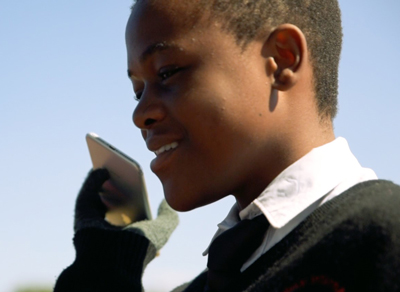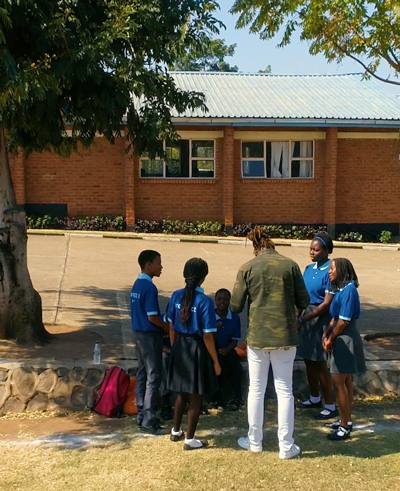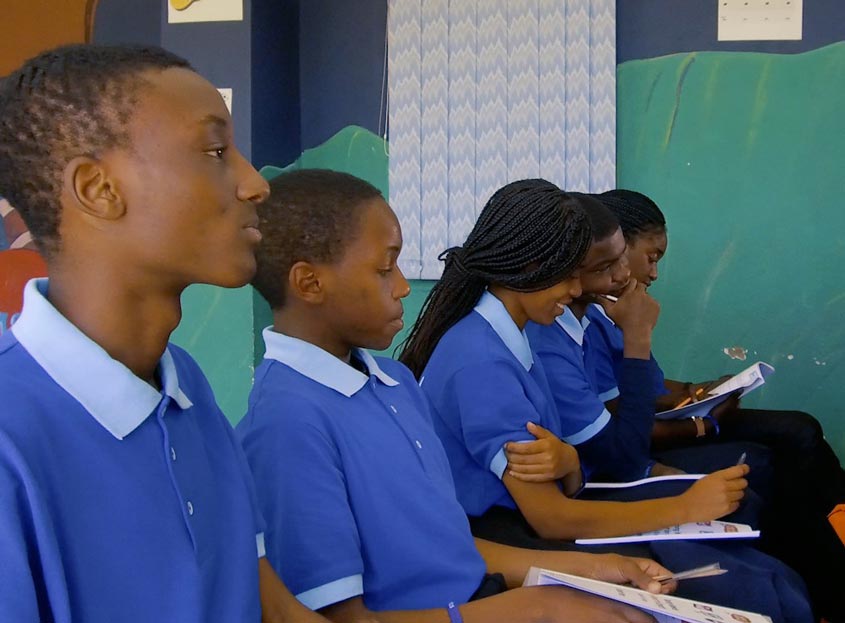By Thomas Dillon, Building Respect for IP Division, WIPO
The sun is rising on a cool winter morning in Lilongwe as Ludo, 15, walks to catch the bus to school. On her way, she listens on her headphones to the music she has downloaded from the Internet. “I don’t really care about where my music comes from,” she says, “I feel like it’s still music at the end of the day. I don’t really think sharing music with my friends is bad, we just listen to music together.” Ludo’s views are shared by many teenagers across Malawi. That’s why WIPO recently teamed up with the Copyright Society of Malawi (COSOMA) to roll out a project that sought to change these perceptions.

Malawi (COSOMA) in rolling out a project that demonstrates that
young people are very receptive to the concepts of intellectual
property when they are presented in an engaging way (photo: WIPO).
Thanks to these efforts, Ludo and her classmates at the Mount Sinai International School now have a completely different take on copyright. In June 2018, the school took part in a WIPO-led project, undertaken in cooperation with COSOMA, to raise awareness among teachers and school children about the role and importance of copyright. The project made use of teaching materials created by WIPO, with the support of the Ministry of Culture, Sports and Tourism (MCST) of the Republic of Korea (see box).
Pop-star seals copyright awareness
The pupils learned about copyright and the need to respect creators’ rights during a workshop in which they met with the Malawian pop star, Tay Grin. The musician explained how copyright enables him to earn a living from his work and to keep making music, and how when his music is downloaded illegally, he doesn’t get a penny.
“It’s difficult to make a living from music in Malawi, because we don’t have platforms where we can actually sell our music. It is easy for anyone to load it up onto sites where it’s downloaded illegally,” the musician explains.

and explains how copyright enables him to earn
a living from his music (photo: WIPO).
People don’t understand copyright; they don’t
says Tay Grin, highlighting a key barrier to building
know what it is there for. And, and when you
don’t know you’re breaking a law, it’s easy to
go ahead and continue doing what you’re doing,
respect for the rights of creators in Malawi and elsewhere.
“People don’t understand copyright; they don’t know what it is there for. And when you don’t know you’re breaking a law, it’s easy to go ahead and continue doing what you’re doing,” he says, highlighting a key barrier to building respect for the rights of creators in Malawi and elsewhere.
New IP awareness videos
To capture the pupils’ experience and ensure that others can better understand the importance of copyright, WIPO and its partners engaged South African producer, Shane Potgieter, to create a short video for use in broader IP awareness-raising activities. That video, and a shorter two-minute interview with Tay Grin in which he shares his thoughts on the importance of copyright to the music industry and his own career, are available on WIPO’s YouTube channel at: www.youtube.com/watch?v=nQlzcKWWB98. Other subtitled language versions will be available in due course.
The five-minute video focuses on Ludo, who explains how much she enjoys music, including the work of Tay Grin, which she downloads and shares with friends. At first she doesn’t see anything wrong with this.
The video then cuts to Tay Grin at work in his studio. He takes a pause to talk about the predicament facing musicians in Malawi. These talented artists want to build a career around music and present Malawian culture on the world stage, but their efforts are hamstrung by widespread online piracy.
Back at school, students are concentrating on their teacher’s explanation of copyright, using the teaching materials developed by WIPO with MCST’s support. Ludo is thoughtful. “When the teacher was talking about intellectual property, I didn’t really think that someone could steal something that is not physical, like music, or writing,” she reflects. “He taught me a lot, especially about copyright and how we have to respect each other’s creative ideas and thoughts.”
About the Respect For Copyright teaching materials
The Respect For Copyright materials are available online in English at: www.respectforcopyright.org, and in Spanish at: www.respetoporelderechodeautor.org. Printed versions are also available in Arabic and French.
The materials are designed to help teachers introduce copyright to young people between the ages of 10 and 15 and to encourage pupils to think about the importance of intellectual property (IP) for culture and the economy.
The concept of respect lies at the heart of the materials, which lead students, through debate and discussion, to a better understanding of the links between creative activity and IP.
In the next scene, Tay Grin strides into the school gymnasium, and is greeted with rapturous cheers by a hundred or so students. This is certainly a day they will remember for a long time. Tay Grin engages with the students and asks how many of them like his music. “Do you download my music legally, as in, do you pay for it? Or do you download it illegally? Be honest, be honest…,” he urges. The pupils aren’t quite sure how to respond, but most admit that they typically download his music illegally. This comes as no surprise to the musician.
He takes the opportunity to explain the impact their actions have on musicians. “Let me tell you why that is wrong. You see, the more you download something illegally, what happens is we don’t make money, and, in the future, you may start to ask yourself, ‘There used to be this guy called Tay Grin, and he used to do music. He doesn’t do music anymore, what happened?’ Usually that happens because artists are not making their money and people are infringing on their copyright. You understand the importance of that, right?”

Tay Grin’s explanation strikes a powerful chord among the students. In the shade of a tree on the school grounds, Ludo and her friends are clearly impressed by his explanation and thank him for taking the time to tell them about copyright. He, too, is delighted that they seem to have taken on board his message about the role that copyright plays and how it enables musicians to earn a living from their work and continue to make music. The clip ends on a positive note, with Ludo and her friends joining with the musician in singing a few bars of his latest hit.
This experience in Malawi demonstrates that young people are very receptive to IP concepts when they are presented in an engaging way. From this beginning, COSOMA will seek to extend its work with schools across Malawi to raise awareness of the role of copyright in sustaining Malawi’s musical culture and the livelihoods of its many talented artists. And for the Mount Sinai International School, this year’s workshop promises to become an annual event.
Other WIPO-sponsored video projects on the theme of building respect for IP are in the pipeline. Alongside www.respectforcopyright.org, WIPO is promoting its online learning tool www.respectfortrademarks.org, which provides teachers and pupils with a range of engaging teaching materials on the importance of trademarks and what it takes to create them.
These and other engaging tools that explain the role and importance of IP rights in a clear and compelling way will help build a young generation that is IP-aware and more respectful of creators’ IP rights in the future.

